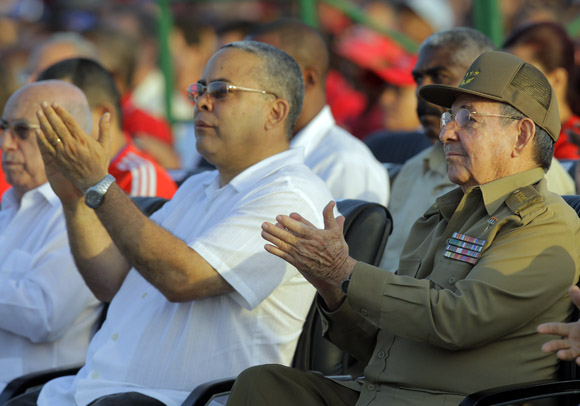
Again, Cuba’s general-president has offered his gastronomic policy to the American president. “The table is set…” said a Raúl Castro who appeared erratic and inconsistent at the podium this 26th of July, as if a touch of rum had been added to his morning coffee. He laughed at his own bad jokes like some street corner drunk, alternating with pathetic bravado. The public appearances of the Cuban leaders are a real embarrassment to the nation. Unfortunately for him, despite his antics the government to the north doesn’t seem interested in the love feast, perhaps because it’s unworthy of democratic governments to negotiate with dictators.
Most contradictory is that in the same address just minutes before, Castro II had accused the “empire” of trying to subvert order in Cuba and of hoping that the same thing would happen here as in Libya or Syria, using for this the internal dissent (mercenary, annexationist, submissive). It is at least paradoxical that a government resists dialog with its own opposition and with all representatives of alternative civil society and, instead, tries to sit down at the negotiating table with a foreign government and, what’s more, with one distinguished with the official epithet of “enemy.” The general insists on declaring that Cuba is sovereign but calls into question such sovereignty by wanting to resolve the internal conflicts of a nation with the power that supposedly provokes them. The apotheosis of absurdity.
On the other hand, it is the Cuban authorities and not the dissidents who are leading the violence within Cuba, which reinforces the thesis that official fear becomes hatred and repression. For many years opposition sectors have tried to establish a path for dialog with the government, without success. The world is a witness to the fact that the Cuban dissidence, contrary to that of other countries, uses peaceful methods to promote its demands and is not armed, so it does not constitute a danger to national security.
The government, however, is a powder keg that threatens internal peace and it is increasing the pressure on a conflict with unpredictable consequences. Far from recognizing the legitimate right of citizens to dissent and propose alternatives, given the acute structural crisis of the system, the military caste has chosen to increase the persecution and harassment against all demonstrations of civic dissent. Furthermore, it appears to have a strategy directed at assassinating selected leaders of the opposition and of independent civil society.
In October 2011 it was Laura Pollán, this time they got rid of Oswaldo Payá, an opponent who fought for democratic changes in Cuba for more than 20 years and who put the government in a straitjacket with his Varela Project, forcing them to unmask themselves with the farce of a plebiscite on “eternal socialism.” Events show that they didn’t forgive him.
It must be made clear that the Island’s authorities are directly responsible for the turn of events in Cuba. A nation is not governed based on terror and force, nor on negotiating with foreign powers. The government, incapable of overcoming the internal crisis and recognizing citizens’ rights, increasingly loses any semblance of legitimacy before Cubans.
A peaceful solution to Cuba’s problem is becoming ever more elusive, thanks the stubbornness of an olive-green gerontocracy; but in any case, it is not ethical to dialog with assassins. Perhaps when some come to understand that a negotiated solution is preferable, they will find themselves at an empty table.
Note: I could not find a picture on official government websites of R. Castro standing on the podium on July 26, 2012.
July 30 2012
